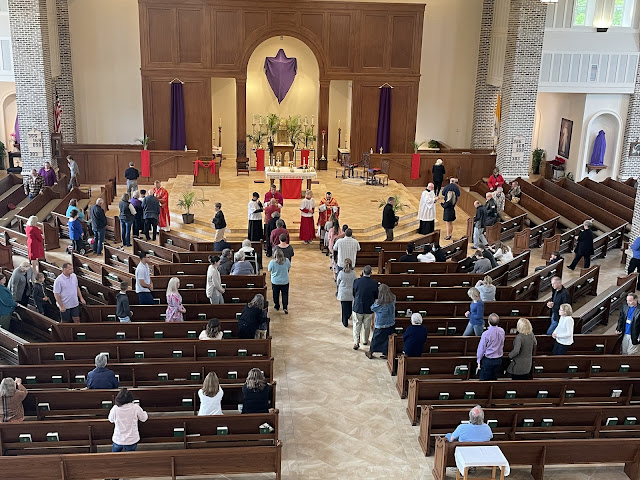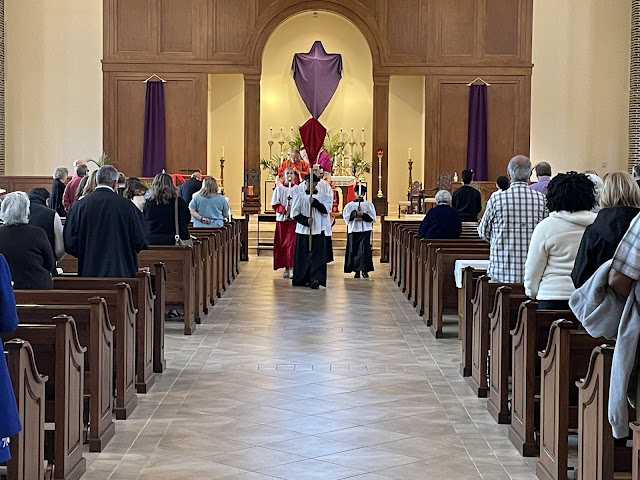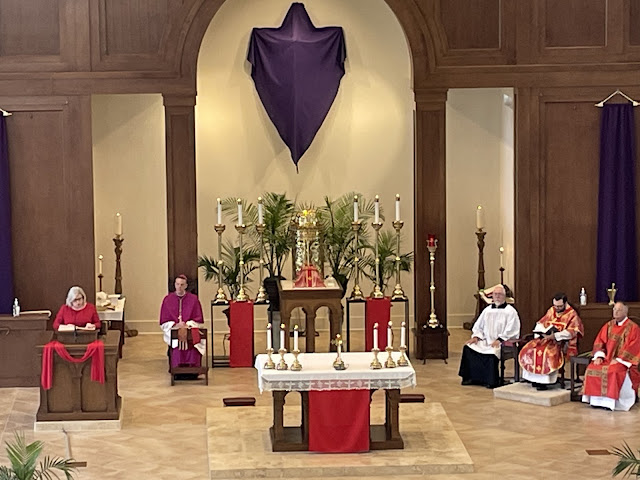At our Saturday’s Palm Sunday Vigil Mass with our bishop presiding, not celebrating, and our parochial vicar the celebrant, I decided to be the photographer. I began downstairs and moved to the choir loft. I participated in the Mass as a layperson would do.
At Communion time, I remained in the choir loft and did not go down to receive Holy Communion. But and this is a big but, I felt as though I still experienced abundant graces from the being present at Mass, hearing the Word of God, the splendid homily of the bishop, and the One Sacrifice of Christ sacramentally experienced in the Liturgy of the Eucharist.
I am not denigrating receiving Holy Communion, it is to be preferred when one is in a state of grace. It is the fulfillment of the Mass but not all can or may receive and thus just being present and engaged in the Mass is a moment of abundant graces too.
It also reminded me of my experience of the pre-Vatican II Church as a child and young teenager. Maybe 1/3 of the parish church in Augusta actually received Holy Communion, let’s say 12 to 20 % of those present. But about 90% of the parish attended Mass each Sunday.
Today, only 12 to 20% of all Catholics attend Mass in this country and of that percentage attending 100% receive Holy Communion or is it 90%?























6 comments:
Of course when I was a young boy, Pre-Vatican II, far less people received Holy Communion since most would not receive unless they had been to Confession to be sure they were in a state of grace. During Mass it was quite common for people to go to Confession (we had 4 priests in the rectory then, so it was not a problem to make this accomodation) in order to receive at that Mass. Now many people treat the Eucharist like a goodie, so all receive. I have a relative who is no longer a practicing the Catholic Faith and when he attends a Catholic funeral or wedding, he does not receive Holy Communion. I have more respect for him than Catholics whom we know should not be receiving Holy Communion.
There are so many things wrong with our understanding of Mass, the sacraments, grace, and "participation" that one wonders where to begin.
I get so frustrated when someone says, "I don't get anything out of Mass." Yes, I make allowances for folks not saying it the right way, but even then: yes, you do, it's called GRACE. Grace is the greatest thing (if it is a "thing") there is. If you dropped out of the sky in some random place, and you spoke not a single word, and for whatever reason, didn't realize it was a Catholic church, and that Holy Mass was underway (lots of "ifs"), you would STILL benefit, it seems to me, if you have any openness at all.
No, this is not an argument that making things intelligible and sensible has no value. On the contrary. Having a Catholic church bear certain universal signs, no matter where in the world it is, and having the Holy Mass manifest certain forms that are likewise universal, would help that poor soul dropped down wherever it was. Oh, and having some Latin used (as mandated by the actual Vatican II, not the unclean spirit engaged in a masquerade) would help too, hmm?
I do understand the challenge; I've been to Mass in many languages, and felt the weirdness of it not being *my* language, and the dislike of not having much help. However, it isn't personal. There's a certain narcissism or immaturity at work when among people of a culture and language not ones own, and getting *upset* at limited understanding. And to use a current term, this mindset savors of "ableism": because when you insist that you cannot truly "participate" unless you *hear* or *see* or linguistically *understand* everything (this a frequent argument against the quiet of a low Mass, the orientation of the priest when he faces liturgical east, and against the use of even *some* Latin), is that not "able-ist"? The blind cannot see any of it; the deaf cannot hear any of it, etc. -- so apparently they cannot genuinely "participate"? (To be continued...)
To continue my rant...
Here might be a useful survey for the bishops to conduct, but it would need to be fairly intensive and therefore time-consuming and expensive:
Ask, say, 100 "ordinary" Catholics some in-depth questions about what they think is going on at Mass. What do they think Mass "is"? I.e., both on a surface and below-the-surface level.
Do they think it's a kind of pep-talk from headquarters? A social check-in? An instruction session that's not very effective because of the old-fashioned and too-high-level terminology used by the readings and prayers? Well, there's part of the answer: pretty much everyone would say it's some sort of "prayer," or even, several types of prayer; but that doesn't explain everything. Why sing the music we do? Is that to entertain God? Or to get us "in the mood"? Setting that aside, why pray the way we do at Mass? Couldn't it all be done much more clearly or efficiently? Maybe everyone could write out prayers on slips of paper and they could be collected or deposited somewhere?
If I were in charge of this interview project, I'd want to follow up: "when you say it's about 'getting spiritually recharged,' what does that mean?" Likewise when people knew the answers they are supposed to give: "what do you mean by a 'representation' of Calvary?"
And, of course, such a series of intensive interviews has to be handled just right, so that people don't get flustered and offended. The point isn't to embarrass people because they don't know something or don't know how to say it; the point is precisely what I said: what do people suppose Mass is? How do you fix a problem without having a really good notion of what the problem is?
There's my thesis: too many Catholics do not know what Mass is, what grace is, and therefore, what "participation" is.
Father Fox,
You are a jewel. I wish we could clone you and Father McDonald! We have so many “empty cassocks” running around, although they are gradually dying off. I was trained prior to the Council and maybe my experience was unusual. I attended the High Mass on the campus of the University of Notre Dame and was exposed to sacred music at its very best. My kindergarten teacher’s husband was the Director of the Notre Dame Glee Club. My grade school had a daily Missa Cantata and I began to learn chant in the first grade. We were blessed to have a sister who was an organist of concert caliber and she taught us how to pronounce the Latin of the Mass properly and how to use the Missal. When the “reforms” came I was horrified and unhappy. I noticed people in their 40s and 50s were the most excited about the “reforms.” I not only engaged in participatio actuosa but had a decent theological understanding of the Mass. I am losing patience with the promise of the fruits of the OF. I am not some crank but someone who gave over 40 years to OF music ministry as a cantor, choir member and organist.
Father Fox when I’m forced to attend a NO mass I get sick in the stomach. Annabale and his demons destroyed the Mass of the Ages and what is left is a show, which is why so many have left these last 56 years.
Father McDonald did someone score a touchdown during mass as that one picture looked like a referee sign.I got a touchdown. Just saying.
Working on being more charitable.
What is the lady in the veil doing? Making an imaginary box? Anyway, I had a priest scold me recently for not going to receive Holy Communion at Mass. I held back because I needed to go to Confession. During my confession the priest told me that the sin I was worried about was venial and that the devil tricks people into not going to receive Holy Communion during Mass. I know from childhood that Holy Communion forgives venial sins, but never had a priest encourage receiving Holy Communion when uncertain about a sin, before being able to go to Confession. I have always been taught to not receive if uncertain. You know the part about eating and drinking your own damnation? I certainly do.
Post a Comment